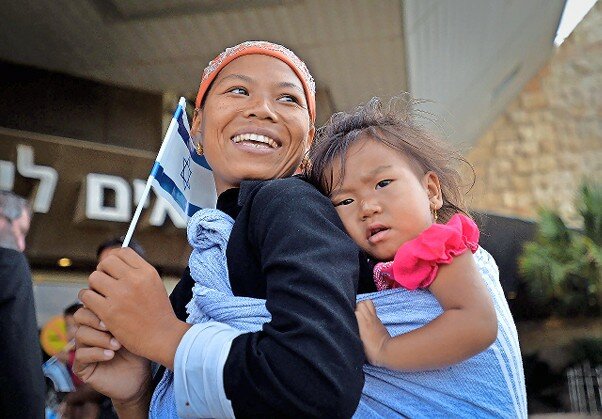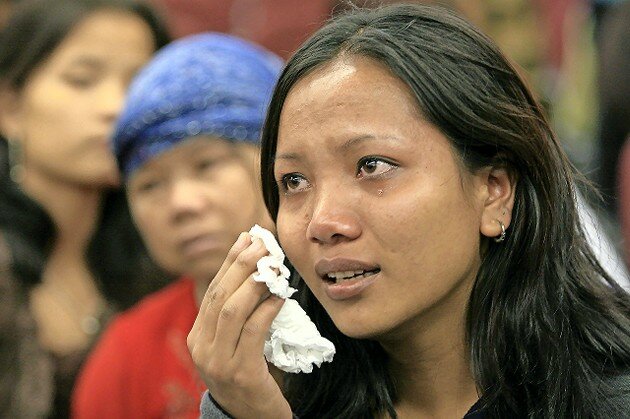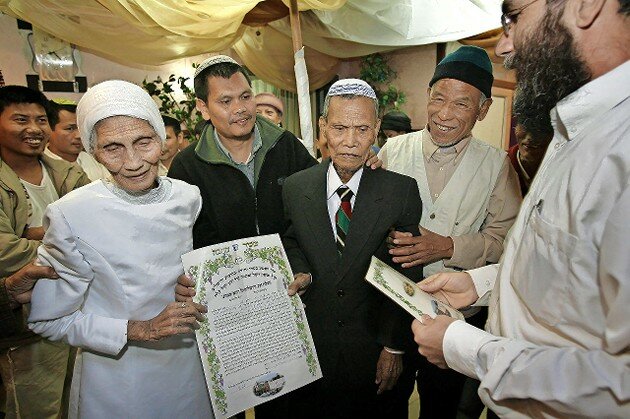Dire rush to rescue Bnei Menashe as ethnic violence spreads in India
Caught in the middle of violence between northeastern India’s Meitei Hindus and Kuki Christians, the Bnei Menashe, who claim descent from a lost biblical tribe and whom Israel accepts upon conversion, have been displaced from their homes. The Bnei Menashe identify as Jews, most belonging to the Mizo and Kuki ethnic groups that hail from the hills of the Indian state of Manipur.
Synagogues, Torah scrolls and a mikvah reportedly have been burnt; Yoel Bayta, a Bnei Menashe father of four, has been killed, and some 200 homes and churches set ablaze in Manipur. Many people have been living in shelters awaiting the chance to return home, and some have been unable to reach missing family members.
“The conditions we face are appalling,” Lalam Hangshing, chairman of the Bnei Menashe Council, told JNS.
The recent violence has broken out largely in the state’s capital, Imphal, and the village of Beit Shalom.
Lemuel Haokip, another communal leader, told JNS that the homes of many members of the group were razed, and the Bnei Menashe had to flee to the forest to hide until the Indian military arrived. Individuals are now housed in military camps operated by the Assam Rifles — part of the Central Armed Police Forces under India’s home affairs ministry — and others are hiding in private residences.
Conditions in the military camps are “very chaotic,” and the Bnei Menashe and others are “living in squalor,” Haokip told JNS.
Those in the camps have to wait in line for three hours to receive basic meals, rice and lentils, with more than 100 people assigned to a single toilet and shower facility, according to Haokip. People are sleeping on mats on floors or in makeshift tents.
The government has been trying to return people to their homes, but there are still reports of mobs attacking the camps and vehicles parked outside the camps, said Haokip.
Disagreements about which “scheduled” tribes the Indian state recognizes triggered the recent violence. For years, the Meitei Hindus, who form the majority of Manipur’s population, have sought recognition in the category, for which the government sets aside jobs, college admissions and elected seats, responding to historical discrimination and exclusion.
Haokip and Hangshing told JNS that only scheduled tribes can purchase land in the Manipur hill region, and there is a fear that if the Meitei are granted that status, then they will take over the land inhabited currently by the Kuki, Mizo, Naga and other hill tribes.
India deployed its army to Manipur with shoot-on-sight orders to halt the riots.
“It is just appalling that the state government took two days to quell the riots, but the central government of New Delhi was able to do it in no time,” Hangshing told JNS. “The state government has behaved like medieval warlords and is complicit in this.”
Rioters have attacked buses and private vehicles transporting displaced people, according to Hangshing. “Whichever corner the army can’t get to, the Bnei Menashe will face impending danger.”
He added that there are reports of Meitei attacking houses of worship used by Christians from their own group. “The fact that they torched churches attended by their own ethnic group shows how much disregard they have,” he said.
An estimated 5,000 Bnei Menashe remain in India, and nearly that same number has made aliyah in the past several decades. They must undergo conversion to be officially recognized as Jews in Israel, and as such, be able to serve in the military, receive financial and other benefits, and marry. The government and religious leadership view the Bnei Menashe as a “lost” tribe.
The Bnei Menashe, or “Sons of Manasseh,” claim descent from one of the Ten Lost Tribes of Israel, exiled by the Assyrian Empire more than 2,700 years ago. Their ancestors wandered through Central Asia and the Far East before settling in what is today northeastern India along the borders of Burma and Bangladesh, according to Shavei Israel, an NGO that promotes the immigration of Bnei Menashe.
Shimon Gangte, a Bnei Menashe leader in Israel, told JNS that the Indian government has blocked the Internet and social media, and some displaced people lack the means to charge their phones. This hampers their ability to contact their loved ones in this difficult time.
There is no indication that there is antisemitism involved in the current violence, which seems to involve the Bnei Menashe insofar as they are Kuki and Mizo.
Isaac (Yitchak) Thangjom serves as the Israel-based director of Degel Menashe, a group that aids Bnei Menashe people in India and Israel and that grew out of an oral history project funded by the Jewish Federation of New Mexico.
“This is ethnic cleansing,” he told JNS. “We urge the Indian government to expedite a comprehensive investigation. The perpetrators should be brought to justice.”

 48.0°,
Light Rain
48.0°,
Light Rain 









